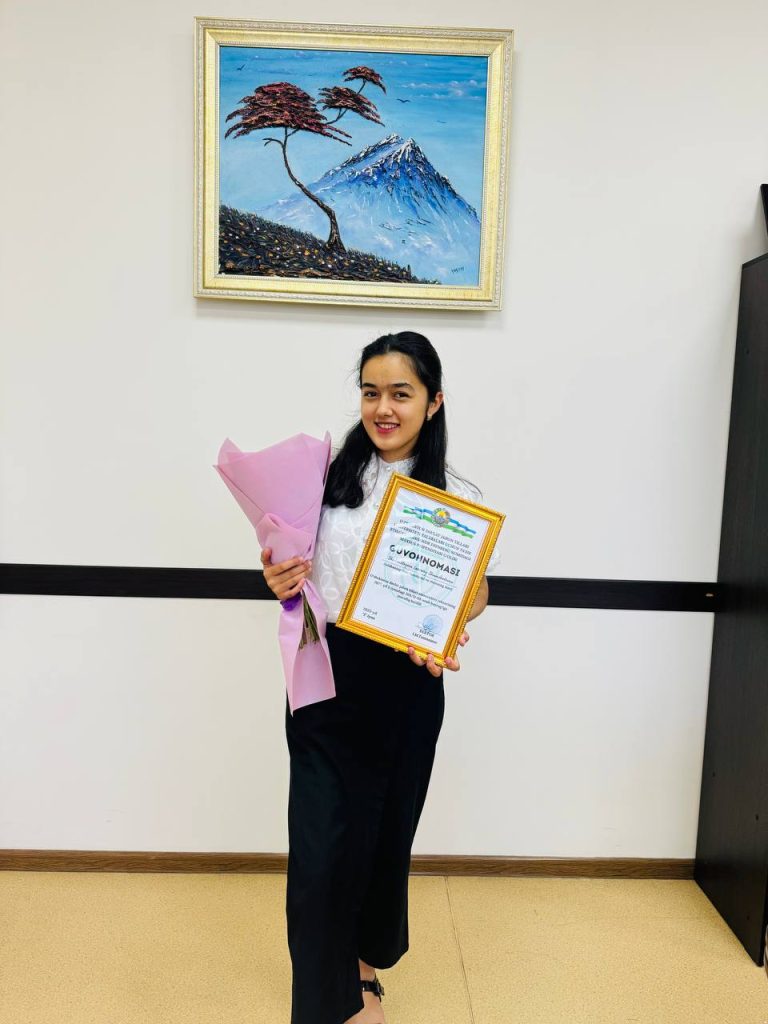Basic Verb Tenses in English and Their Uzbek Equivalents
Olimboyeva Dilaferuz Azamat qizi
Uzbekistan State World Languages University
alijonolimbayev99@gmail.com
Abstract
This article presents a comparative linguistic analysis of basic verb tenses in English and their functional equivalents in the Uzbek language. English, as an analytical language, relies heavily on auxiliary verbs and syntactic structure to indicate tense, while Uzbek, an agglutinative language, primarily uses suffixes and postpositions to convey temporal relations. The study focuses on four fundamental tenses in English—Present Simple, Past Simple, Future Simple, and Present Continuous—and examines how these are rendered in Uzbek in terms of morphology, semantics, and syntax.
Drawing from both theoretical and practical sources, the paper provides illustrative examples and pedagogical insights to aid language learners, translators, and linguists in mastering cross-linguistic tense equivalence. The analysis emphasizes the contextual flexibility of Uzbek tense usage, contrasts it with the structural rigidity of English tense systems, and highlights translation challenges that arise in bilingual contexts.
Keywords
Verb tense, present simple, past simple, future simple, present continuous, auxiliary verbs, agglutinative morphology, English-Uzbek translation, comparative grammar, language typology
Tense, as a grammatical category, is a fundamental aspect of verbal systems in most natural languages. It allows speakers to locate events in time and to distinguish between actions occurring in the past, present, or future. English verb tenses are traditionally divided into 12 forms, including simple, continuous, perfect, and perfect continuous tenses. Uzbek, on the other hand, organizes tense through suffixation, and tends to express time relationally rather than structurally.
In the Uzbek language, tense is generally encoded through the verb morphology itself, without the need for auxiliary verbs. The system is simpler in appearance but allows a rich variety of aspectual meanings. This article focuses on four core tenses that are most frequently encountered in beginner and intermediate language instruction: Present Simple, Past Simple, Future Simple, and Present Continuous. Understanding their use and equivalents is crucial for effective communication, translation accuracy, and grammar instruction.
In particular, the paper aims to: Analyze the structure and function of each English tense. Explore the morphological markers in Uzbek that carry similar meanings. Provide comparative examples and highlight cross-linguistic differences. Identify challenges in translation and language learning contexts. In English, the Present Simple Tense is generally used for habitual actions, repeated occurrences, facts, and general truths. Its basic form uses the root verb for most persons and adds an -s or -es ending for the third person singular: I walk to school. She walks to school.
The Uzbek equivalent of this tense is typically formed using the suffix -(a)di, which marks both present habitual and simple future meanings depending on context: Men har kuni maktabga boraman. → I go to school every day. U har kuni ertalab yuguradi. → She runs every morning. One challenge for Uzbek learners of English is the use of the third person singular -s ending in English, which does not have a direct morphological parallel in Uzbek. In Uzbek, the subject-verb agreement is expressed through personal suffixes, not through separate verb conjugations based on person as in English.
Furthermore, English also uses do-support in negative and interrogative forms, which has no direct equivalent in Uzbek: Do you like tea? → Senga choy yoqadimi? He doesn’t understand. → U tushunmaydi. Here, Uzbek expresses negation directly within the verb using -ma/-may suffixes, not through auxiliary verbs like “do/does.”Thus, while the Present Simple tense appears straightforward in English, its accurate mapping into Uzbek requires attention to aspect, personal endings, and the syntactic role of auxiliaries in English.
The Past Simple Tense in English denotes actions completed in the past at a definite time. Its structure involves the use of the past form of the verb, which in regular cases is formed by adding -ed, and in irregular cases varies widely (e.g., go → went, take → took): They watched a movie last night. She went to the market yesterday. In Uzbek, the past is expressed using the suffix -di or its phonological variants -ti, -di, -dilar (for politeness or plural subjects): Ular kecha kino ko‘rdilar. → They watched a movie yesterday. U bozorda meva oldi. → She bought fruits at the market.
Moreover, questions in the past are formed using -mi particles, unlike English which uses the auxiliary did: Did he see the letter? → U xatni ko‘rdimi? Uzbek verbs also tend to imply aspects of the action more fluidly. The context often determines whether the action is viewed as completed, ongoing, or habitual, without needing a separate grammatical category for each. This makes the Uzbek past tense morphologically simpler but semantically richer, requiring learners to rely more on context than form.
The Future Simple Tense in English refers to actions that will occur after the present moment and is typically formed with the auxiliary “will” followed by the base verb: I will help you tomorrow. They will arrive soon. In Uzbek, the equivalent tense is often expressed with the same suffix -(a)di, or with more explicit constructions such as -moqchi bo‘lmoq to denote intention or planned future: Men ertaga yordam beraman. → I will help tomorrow. Ular yaqin orada yetib kelishadi. → They will arrive soon. Men sizga telefon qilmoqchiman. → I intend to call you.
One interesting difference is that the same Uzbek suffix -(a)di is used for both habitual present and near-future actions, and only context determines the meaning. This polyfunctionality requires learners to pay close attention to time adverbials like ertaga (tomorrow), tez orada (soon), etc. In more formal or intentional future constructions, Uzbek uses the -moqchi bo‘lmoq structure:U imtihon topshirmoqchi. → He intends to take the exam. Unlike English, which uniformly uses “will” or sometimes “shall,” Uzbek has a range of optional markers, making its future tense more nuanced in intent and modality.
The Present Continuous Tense in English expresses actions that are currently in progress. Its structure includes the verb “to be” in present tense and the main verb in -ing form: She is reading a book. We are watching a movie. The Uzbek equivalent is formed with the suffix -yapti, attached directly to the verb root:U kitob o‘qiyapti. → She is reading a book. Biz film ko‘ryapmiz. → We are watching a movie.In both languages, this tense conveys immediacy and duration. However, unlike English, which needs an auxiliary and a participle, Uzbek uses a single analytic suffix.
Negative forms in English:I am not eating. Uzbek: Men ovqat yemayapman. Another notable feature in Uzbek is the use of present continuous for polite or soft assertions: Siz nimani kutyapsiz? → What are you waiting for?
For Uzbek learners of English, mastering the auxiliary verb “to be” (am/is/are) and using the –ing form correctly presents one of the most common grammatical hurdles. The comparative study of English and Uzbek verb tenses reveals fundamental structural, morphological, and semantic differences between the two languages. English relies on auxiliary verbs, inflectional patterns, and strict syntactic rules, while Uzbek uses agglutinative suffixation, contextual flexibility, and syntactic economy.
While certain tenses such as Present Continuous align well between the two systems, others like Future Simple or Present Simple demonstrate functional overlap but grammatical divergence. For translation studies and second language acquisition, these findings stress the importance of contextual interpretation, especially for Uzbek speakers learning English. Understanding these cross-linguistic patterns can aid educators in constructing more effective grammar curricula, and support translators in producing more accurate target texts.
References
1. Crystal, D. (2003). The Cambridge Encyclopedia of the English Language. Cambridge University Press.
2. Eastwood, J. (1994). Oxford Guide to English Grammar. Oxford University Press.
3. Bozorov, O. (2005). Ingliz tili grammatikasi. Toshkent: O‘qituvchi nashriyoti.
4. Karimov, A. (2010). Hozirgi o‘zbek adabiy tili. Toshkent: O‘zR FA nashriyoti.
5. Hudoyberganova, D. (2017). Qiyosiy tipologiya: Ingliz va o‘zbek tillarining qiyosiy tahlili. Toshkent: TDPU.
6. Comrie, B. (1985). Tense. Cambridge: Cambridge University Press.
7. Richards, J. C., & Schmidt, R. (2010). Longman Dictionary of Language Teaching and Applied Linguistics. Longman.






